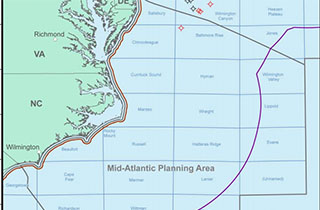(Bloomberg) -- The Obama administration is reversing course on opening Atlantic waters to a new generation of oil and gas drilling, after a revolt by environmentalists and coastal communities that said the activity threatened marine life, fishing and tourism along the U.S. East Coast.
The proposed offshore leasing program being released Tuesday eliminates the administration’s initial plan to auction off drilling rights in as many as 104 million acres of the mid- and south-Atlantic in 2021, according to an Interior Department statement. The proposal also sets the stage for selling oil and gas leases in the Arctic waters of the Chukchi and Beaufort seas, as well as Alaska’s Cook Inlet and the Gulf of Mexico, where 10 auctions were tentatively scheduled from 2017 to 2022.
"This is a balanced proposal that protects sensitive resources and supports safe and responsible development of the nation’s domestic energy resources to create jobs and reduce our dependence on foreign oil,” Interior Secretary Sally Jewell said in a statement. "The proposal focuses potential lease sales in areas with the highest resource potential, greatest industry interest and established infrastructure."
The Atlantic pullback is a major blow to the oil industry, delivered by a president who once promised an all-of-the-above approach to energy but is now moving aggressively to advance renewable power and cut the greenhouse gas emissions tied to burning fossil fuels. Energy companies had eyed the U.S. Atlantic, where drilling was abandoned decades ago because of high development costs, as a promising frontier, with the potential to supplement eventual production declines on shore.
BP, Shell
Obama’s decision leaves offshore oil producers, such as BP Plc, Chevron Corp. and Royal Dutch Shell Plc, largely confined to the long-tapped Gulf of Mexico. Although the proposal includes U.S. Arctic waters, low oil prices and Shell’s disappointing results at a critical test well in the Chukchi Sea have lowered the industry’s appetite for new drilling there for now.
The about-face also is a defeat for the governors of Georgia, South Carolina, North Carolina and Virginia, who had lobbied for nearby offshore drilling they say would create jobs and new economic activity.
Environmentalists hailed the decision Tuesday as a victory for whales, sturgeon and other animals that live in the Atlantic -- as well as the fishermen, boaters and hotel operators whose lives and livelihoods are tied to those waters.
‘Giant Step’
“President Obama has taken a giant step for our oceans, for coastal economies and for mitigating climate change,” said Jacqueline Savitz, U.S. vice president for the conservation group Oceana, in an e-mailed statement. “This is a courageous decision that begins the shift to a new energy paradigm, where clean energy replaces fossil fuels, and where we can avoid the worst impacts of decades of our carbon dioxide emissions.”
Sierra Weaver, a senior attorney with the Southern Environmental Law Center, said the win reflects “the hard work of thousands of people and a collection of communities and elected leaders from both parties who stood up to protect the Southeast’s beautiful beaches."
Offshore drilling in the Atlantic is "an exploration activity that hopefully leads to the discoveries that give us our energy security and put us on a road to energy independence," said Erik Milito, the American Petroleum Institute’s director of upstream and industry operations. "Canada, Cuba, Venezuela, South America, Europe, West Africa -- they all do it, and we’re sitting back kind of witnessing it without exploring ourselves."
It’s unclear how much oil and gas could be deposited along the U.S. East Coast; government projections using decades-old geological surveys estimate 3.3 billion barrels of oil and 31.3 trillion cubic feet of natural gas. Geologists say discoveries in other Atlantic waters around the world suggest even bigger potential.
Arctic Waters
The plan being released Tuesday is only the latest step in a long, multiyear process of developing the U.S. government’s five-year offshore leasing program, with both the available acreage and the number of auctions generally whittled over time. Both the proposal and an environmental analysis of the program now will be subject to public comment and could be further revised before the Obama administration finalizes it late this year.
The most likely changes now could be on the proposed Arctic lease sales -- one each in the Beaufort and Chukchi seas north of Alaska. The Interior Department’s Bureau of Ocean Energy Management has identified several areas where there is potential conflict between energy development and ecological resources or subsistence activities. The agency is asking the public to weigh on how to protect the territory.
’Unique Place’
“We know the Arctic is a unique place of critical importance to many – including Alaska Natives who rely on the ocean for subsistence,” Interior Secretary Jewell said. “As we put together the final proposal, we want to hear from the public to help determine whether these areas are appropriate for future leasing and how we can protect environmental, cultural and subsistence resources.”
Environmentalists blasted the administration for keeping Arctic drilling on the table and said they would lobby for lease sales in the Chukchi and Beaufort seas to be spiked later.
Conservationists argue the Interior Department must preclude Arctic drilling to fulfill a pledge President Barack Obama made with Canadian Prime Minister Justin Trudeau to weigh "the life-cycle impacts of commercial activities in the Arctic" and satisfy an international climate accord commitment to cut carbon dioxide emissions released when fossil fuels are burned.
Obama Legacy
“Any new offshore drilling will be a stain on President Obama’s climate legacy,” May Boeve, executive director of the group 350.org, said in a statement Monday. "If the president is going to meet the targets he agreed to at the climate talks in Paris, he needs to keep fossil fuels in the ground or in this case, under the sea. We can’t afford any more oil spilling into the oceans and carbon pouring into the atmosphere."
The proposed offshore plan will not affect oil and gas companies’ existing drilling rights in U.S. waters.
Campaign Issue
The drilling debate has stoked passions from the coastline to the campaign stump as former Secretary of State Hillary Clinton and Vermont Senator Bernie Sanders vie for the Democratic presidential nomination. Sanders has promised to block all offshore oil and gas development. Clinton told environmental activists she was “against drilling off the Atlantic” during an event last month in Norfolk, Virginia. The issue has not gotten significant attention in the Republican primary contest, where candidates generally support more domestic oil and gas development.
In weighing which waters to lease, the government is required to consider an array of factors, including the interests of oil and gas producers, the goals of affected states, and the proximity of energy markets.
Interior officials have signaled they were paying attention to the protests of coastal communities, dozens of which used letters and resolutions to formalize their opposition to offshore oil development.
Oil companies and trade groups have countered that the coastal opposition is an outlier, bucking polls that show consistent support for offshore drilling. An analysis by the industry-backed Consumer Energy Alliance said that communities that formally oppose offshore oil development account for no more than 7.2 percent of the total population.
"By removing the entire proposed Atlantic leasing area, the administration has failed to present a serious offshore plan that will help meet our energy needs over the coming decades," Consumer Energy Alliance president David Holt said in an e-mailed statement.
Oil companies drilled 51 wells in U.S. Atlantic waters decades ago, but walked away amid high costs to develop those discoveries.
This isn’t the first time Obama has reversed a plan to open up the Atlantic for offshore drilling; he took similar steps to offer oil and gas leases along the East Coast in 2010 but reversed course after BP’s failed Macondo well blew out in the Gulf of Mexico, keeping the territory out of a 2012-2017 leasing program.




